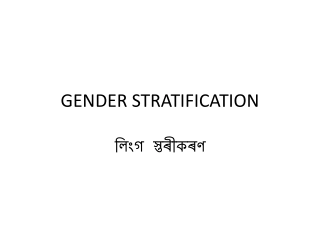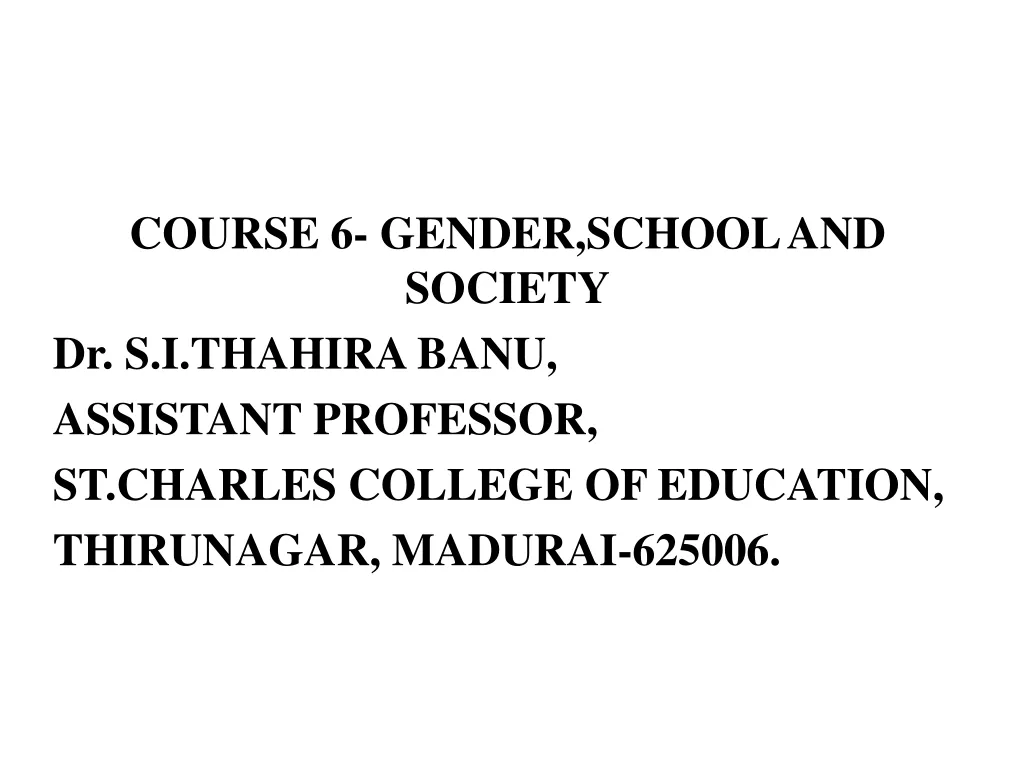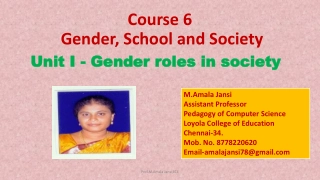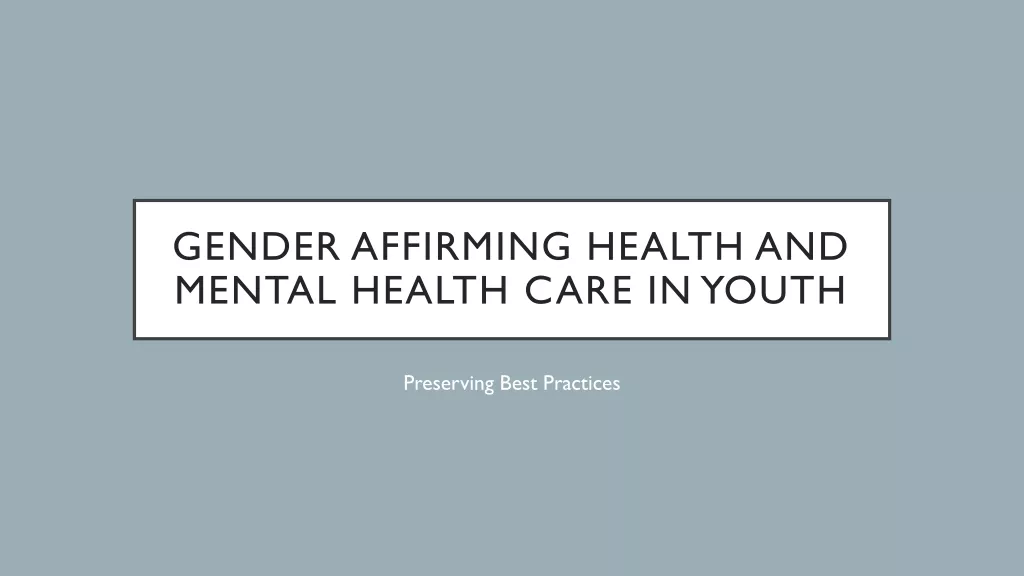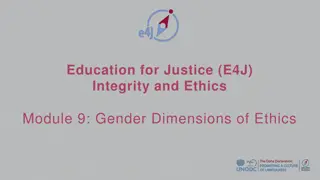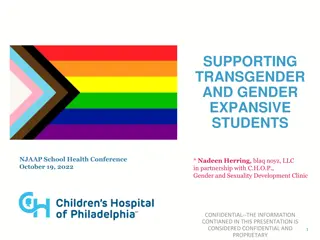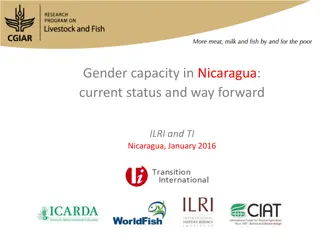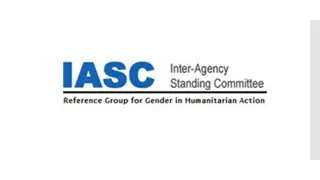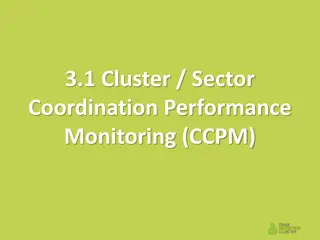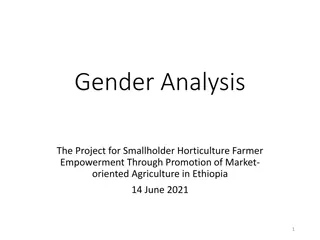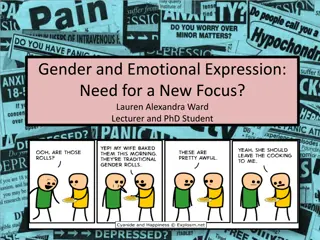
Gender Roles and Ethics in Pandemic Context
The dynamics of gender in outbreaks and pandemics, this course delves into gender roles, ethical considerations, and their impact on preparedness and response efforts. Participants will examine concepts of gender and sex, assess gender issues in pandemic response, and discuss the importance of integrating gender and ethics in pandemic planning.
Download Presentation

Please find below an Image/Link to download the presentation.
The content on the website is provided AS IS for your information and personal use only. It may not be sold, licensed, or shared on other websites without obtaining consent from the author. If you encounter any issues during the download, it is possible that the publisher has removed the file from their server.
You are allowed to download the files provided on this website for personal or commercial use, subject to the condition that they are used lawfully. All files are the property of their respective owners.
The content on the website is provided AS IS for your information and personal use only. It may not be sold, licensed, or shared on other websites without obtaining consent from the author.
E N D
Presentation Transcript
Introductions Webinar etiquette Please place your phone on MUTE if you are not asking a question or not responding to the presenters. If you encounter problems viewing the presentation or hearing the audio, please contact the host/presenter through the chat feature in WebEx. 2
ECR Program Page Website: http://www.nsf.gov/funding/pgm_summ.jsp? pims_id=504924&org=EHR&from=home Full Proposal Deadline Dates: February 3, 2015 September 10, 2015 Second Thursday in September, Annually Thereafter NSF Grant Proposal Guide (NSF 15-1) 3
Introduced in 2013 to support fundamental research to generate foundational knowledge in the following focal areas: STEM learning and STEM learning environments STEM professional workforce development Broadening participation in STEM From the onset, encouraging integration across the focal areas and collaboration among researchers in related disciplines, including social and behavioral sciences. fundamental research to generate foundational knowledge 4
Investing in fundamental research in STEM education about critical areas that are essential, broad and enduring. Seeking proposals that help synthesize, build and/or expand research foundations in the focal areas. Contributing to the accumulation of robust evidence to inform efforts to understand, build theory to explain, and suggest interventions and innovations. 5
Addressing persistent challenges in STEM interest, education, learning, participation and workforce development. Developing foundational knowledge in STEM learning and learning contexts, both formal and informal, from childhood through adulthood, for all groups, and from the earliest developmental stages of life through participation in the workforce. 6
ECR projects are generating, theory testing and predictive. Awards funded by ECR program Use NSF Advanced Award Search: http://www.nsf.gov/awardsearch/advance dSearch.jsp In the Element Code field, enter: 7980 Proposal Types Building proposals ECR projects are: : Theory driven, theory Awards funded by ECR program: : Proposal Types: : Research and Capacity 7
Fall within one or more focal research areas. Test theory that informs core scientific questions about STEM education, learning, participation and workforce development. Fundamental research involving the collection of new data, and/or secondary analyses of extant state, national, international or other databases. Research to develop innovative research methods, metrics and conceptual models to measure existing and emerging phenomena. 8
Level I Maximum award size: $500K Maximum duration: 3 years Level II Maximum award size: $1.5M Maximum duration: 3 years Level III Maximum award size: $2.5M Maximum duration: 5 years 9
Depends on the alignment of the funding request with: Maturity of proposed work. Size and scope of the empirical effort. Capacity of the interdisciplinary team to conduct the research. 10
Aligned with ECR program goals. Synthesis Proposals Synthesis or meta-analysis of existing data on topic of critical importance. May include knowledge diffusion efforts. Workshop and Conference Proposals Conceptual framework, draft agenda, participant list, & outcomes or products. Describe how products serve fundamental research goals of ECR program. Synthesis Proposals: : Workshop and Conference Proposals: : 11
Synthesis Maximum award size: $300K Maximum durations: 2 years Conference and Workshop At lease one year in advance of event. Typical costs are $25K to $100K Can be submitted throughout the year. Follow NSF Grant Proposal Guide. Synthesis Conference and Workshop 12
ECR Program Page Website ECR Program Announcement NSF Grant Proposal Guide (GPG) 14-1, but after 12/26/14: NSF 15-1) Common Guidelines for Education Research and Development FAQs on the 127) ECR Program Page Website (www.nsf.gov) ECR Program Announcement (NSF 15-509) NSF Grant Proposal Guide (GPG) (current NSF Common Guidelines for Education Research and Development (NSF 13-126) FAQs on the Common Guidelines Common Guidelines (NSF 13- 13
Standard or continuing grants Estimate making 64 awards Funding amount is $61,500,000 (pending availability of funds) No PI limit No limit of number of proposals per organization No limit on number of proposals per PI 14
Cover Sheet Project Summary State which of the focal research area(s) are targeted Table of Contents Project Description Restate which focal research area(s) are targeted Must include results from any prior NSF Support for past 5 years: separate intellectual merit and broader impacts reporting Follow the NSF Grant Proposal Guide Follow the NSF Grant Proposal Guide 15
References Cited Biographical Sketch(es) Budget / Budget Justification Current and Pending Support Facilities, Equipment and Other Resources Supplemental Documents: Post-doc Mentoring Plan Data Management Plan 16
Linkages to theory and extant research in the field. Research plan. Contributions to implementation (where applicable). Contributions to foundational knowledge and theory. Communication strategy. Objective external feedback. 17
NSF projects should be of the highest quality and have the potential to advance, if not transform, the frontiers of knowledge. NSF projects, in the aggregate, should contribute more broadly to achieving societal goals. Meaningful assessment and evaluation of NSF funded projects should be based on appropriate metrics, and include both the broader impacts and intellectual merit of the project. 18
Intellectual Merit knowledge. Broader Impacts society and contribute to the achievement of specific, desired societal outcomes. Both criteria, Intellectual Merit will be given full consideration during the review and decision-making processes. Proposers must fully address both Intellectual Merit the potential to advance Broader Impacts the potential to benefit Intellectual Merit and Broader Impact Broader Impact, both criteria. 19
What is the potential for the proposed activity to: Advance knowledge and understanding within its own field or across different fields (Intellectual Merit); and Benefit society or advance desired societal outcomes (Broader Impacts)? To what extent does the proposed activity suggest and explore creative, original or potentially transformative concepts? Is the plan for carrying out the proposed activities well-reasoned, well-organized, and based on a sound rationale? Does the plan incorporate a mechanism to assess success? 20
How well qualified is the individual, team, or organization to conduct the proposed activities? Are there adequate resources available to the PI (either at the home institution or through collaborations) to carry out the proposed activities? Please Facilities, Equipment and Other Resources, Data Management Plan, and Postdoctoral Researcher Mentoring Plan Please Note: Note: Reviewers are also asked to review 21
IRB exemption/approval documentation is required of the award - in order to receive funding. Please plan for the timing necessary to obtain institutional IRB approval. required at the time 22
Address questions to the program via: ECR@nsf.gov ECR@nsf.gov
ECR Program Page Website: http://www.nsf.gov/funding/pgm_summ.jsp? pims_id=504924&org=EHR&from=home Full Proposal Deadline Dates: February 3, 2015 September 10, 2015 Second Thursday in September, Annually Thereafter

